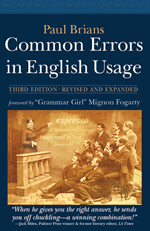When referring to an adult female of the human species it sounds weird and may even be considered insulting to use the noun “female” instead of “woman.” “The female pointed the gun at the cop” should be “the woman pointed the gun at the cop.”
In the case of the related adjectives some people argue that since we say—for instance—“male doctor” we should always say “female doctor” rather than “woman doctor.” It may be inconsistent, but the pattern of referring to females as women performers, professionals, etc. is very traditional, dating back at least to the 14th century. People who do this cannot be accused of committing an error.
Technical adjectival uses defining gender like “female genes” are fine (but don’t confuse them with “women’s jeans”).
Back to list of errors

BUY THE BOOK!
